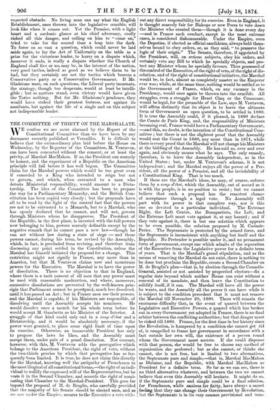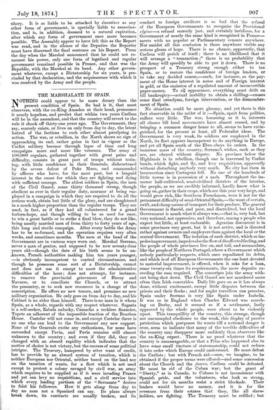THE COMMITTEE OF THIRTY ON TRE ALARSHALATE. WE confess we
are more alarmed by the Report of the
• Constitutional Committee than we have been by any document recently published at Versailles. It is difficult to .believe that the extraordinary plan laid before the House on Wednesday, by the Reporter of the Committee, M. Ventavon, can have been concocted without the consent, or at least the, privity, of Marshal MacMahon. If so, the President can scarcely be honest, and the experiment of a Republic on the American principle will fail before it has well begun. The Committee claim for the Marshal powers which would be too great even if conceded to a King who intended to reign but not to govern and which, when entrusted to a man who detests Ministerial responsibility, would amotint to a Dicta- torship. The idea of the Committee has been to prepare , the way for a Parliamentary Monarchy, and the British Con- stitution has been copied very closely ; but the proposals have all to be read by the light of the central fact that the powers are not to be entrusted to a Monarch, but to a Matshal, who 'has openly declared that he cannot, and will not, govern through Ministers whom he disapproves. The President of the Republic, in the first place, is invested with the full powers now belonging to him, powers scarcely definable except by the negative remark that he cannot pass a new law—though he con act without law during a state of siege and these powers cannot, during his term, be revised by the Assembly, which, in fact, is precluded from revising, and therefore from discussing any point settled in the Constitution, unless the Marshal has himself initiated the proposal for a change. This restriction might not signify in France, any more than in America, but that M. Ventavon claims new and monstrous powers for the Executive. The Marshal is to have the power of dissolution. There is no objection to that in England, where there is a tacit consent of all men that any power must be used with reasonable moderation, and where, moreover, successive dissolutions are prevented by the well-known prin- ciple that Parliament cannot be prorogued, much less dissolved. until it has passed an Act ; but in France men use their powers. and the Marshal is capable, if his Ministers are responsible, of dissolving until the Assembly accepts his nominees. He would dissolve once a month for his whole term before he would accept M. Gambetta as his Minister of the Interior. A struggle of that kind could only end in a coup d'itat and a Dictatorship, and it would be absolutely necessary, if the power were granted, to place some rigid limit of time upon its exercise. Otherwise, an immovable President has only to propose the laws he likes, and the Assembly must
• wept them, under pain of a penal dissolution. Not content, however, with this, M. Ventavon adds the prerogative which belongs to the Auierican President, the right of veto without the two-thirds proviso by which that prerogative lu:s so fre- quently been limited. It is true, he does not claim this directly for the Marshal, knowing well the antipathy of Frenchmen to the most illogical of all constitutiortal forais,—the right of an indi- vidual to nullify the expressed will of the Representatives, but he vests it in the Second Chamber, and accords the right of nomi- nating that Chamber to the Marshal-President. This goes far beyond the proposal of M. de Broglie, who carefully provided that the majority of his Senate should be elected men) and &ft we saw under the Empire, secures to the Executive a veto with-
out any direct responsibility for its exercise. Even in England, it is thought scarcely fair for Bishops or new Peers to vote down the Minister who created them—though it is done every day —and in France such conduct, wept in the meat extreme cases, is considered dishonourable. Under the Empire, eeen the Deputies, if elected as effieial candidates, always held them- selves bound to obey orders, or, as they said, "to praaerva the logic of their origin." The Senate, therefore, if a_ppoiat_e_d by the President, will, on scrims subjecta, obey his orders, and certainly veto any Bill to which he specially objects, and pro- tect any Minister whom he specially favours. Thus possessed of the control of the Executive, of the right of veto,of the right of dis- solution, and of the Right of constitutional initiative, the Marshal would be, in .fact, almost as completely master as the Emperor ever was; while, at the same time, nothing would be aettled as to the Government of France, which, on any vacancy in the Presidency, would once again be thrown into the crucible. All struggles, even a struggle for Henri Chaq or the Commune, would be legal, for the preamble of the Law, says M. Ventavon, will affirm distinctly that its object is to leave the ultimate form of Government an open question, to be settled in 1880. It is true the Assembly could, if it pleased, in 1880 declare the Comte de Paris King, and, the responsibility of Ministers becoming real, France would have a Parliamentary Government, —Laid this, no doubt, is the intention of the Constitutional Com- mittee; but there is not the slightest proof that the Assembly would seat the Count in 1880, any more than in 1874, while there is every proof that the Marshal will not change his -Ministers at the bidding of the Assembly. He has said so, over and over again, and obviously means what he says. The only remedy, therefore, is to leave the Assembly iudependent, as in the United States ; but, wider M. Ventavon'e scheme, it -is not independent ; and the Marshal enjoys all the power of a Pre- sident, all the power of a Premier, and all the inviolability of a Constitutional King. That is too much.
If these are the Marshal's ideas, he may, of course, enforce them by a coup d'e'tat, which the Assembly, out of accord as it is with the people, is in no position to resist ; but we cannot believe that such a proposal has the remotest chance of acceptance through a legal vote. No Assembly will part with its power in that complete way, nor is this one so devoted to a particular individual. The Extreme Right, the Left Centre, the Bonapartists, the Left, and the Extreme Left must vote against it, at any hazard ; and if they vote against it, there is but one solution which appears to be even possible, the solution proposed by M. Casimir- Perier. The Septennate is protected by the armed force, and the Septeanate is inconsistent with anything but itself and the Republic. No Pretender is possible under it, and no permanent form of government, except one which admits of the separation of the Executive from the Legislative power for a definite term of years. That is the Marshal's grand stipulation, and as the means of removing the Marshal do not exist, there is nothing to be done but proclaim the Republic, create a Second Chamber on M. de Broglie'e plan—that is, by election through the Councils- General, assisted or not assisted by propertied electors—fix a regular date beyond which neither House can exist without a renewal of its mandate, and then leave the Constitution to solidify itself, if it can. The Marshal will have all the power he wants, and the Assembly all the power it can have while it is subject to the condition precedent that it nmst not remove the Marshal till November 20, '1880. There will remain the enormous difficulty that, in the event of quarrel between the Legislative and Executive Powers, a quarrel which has broken out in every Government yet adopted in France, there is no final arbiter between the conflicting authorities; but that danger must be risked till 1880. Fraace,for the first time in her history since the Revolution, is hampered by a condition she cannot get rid of, is compelled to frame her government in accordance with a fact outside her own will, the existence of a person round whom the Government must accrete. If she could dispense with that person, she would be tree to choose any method of organisation she preferred ; but as aha cannot, or thinks she cannot, she is not free, but is lirnited to two alternatives, the Septennate pure and simple,—that is, Marshal MacMahon as Dictator, and the Republic, with Marshal MaeMahon as President for a definite term. So far as we can see, there is no third alternative whatever, and between the two we cannot believe that even this Assembly will hesitate. It might do so, if the Septennate pure and simple could be n final solution, for Frenchmen, while aaxioas ler fixity, have always a secret feeling that they can change. their Goverument by Revolution, but the Septennate is in its very essence provisional and Iran- sitory. It is as liable to be attacked by e'meutiers as any other form of government, is specially liable to assassina- tion, and is, in addition, doomed to a natural expiration, after which any form, of government once more becomes possible. The Assembly appear to have felt this as the Report was read, and in the silence of the Deputies the Reporfer must have discerned the final sentence on his Report. From the day when the Marshal announced that he could not re- nounce his power, only one form of legalised and regular government remained possible in France, and that was the Republic, with the Marshal at its head. Any other govern- ment whatever, except a Dictatorship for six years, is pre-
\ eluded by that declaration, and the acquiescence with which it was received by the Army and the people.



































 Previous page
Previous page